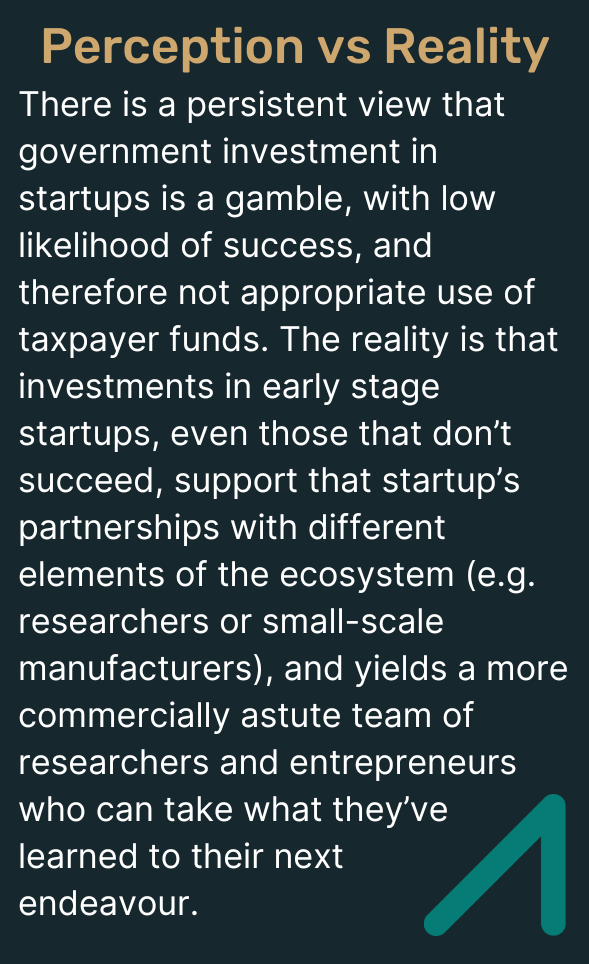By Robert Hughes, Advance.org Research & Insight.

Australia’s track-record in research commercialisation is a persistent shortcoming in the nation’s innovation equation. To unpack this dilemma, Advance convened a Global Town Hall with a panel of experts to describe the state of play in Australia, the issues to address, and the opportunities within our grasp.
The panel agreed that Australia could be a leader in research commercialisation, as many foundational elements exist – with a strong research reputation, a global talent pool and large investment funds. Indeed, Australia punches well above its weight when it comes to research. With world-class universities and research institutions, Australia boasts a supportive research ecosystem that encourages scientific advancements, fosters global collaboration, and encourages interdisciplinary approaches.
But when it comes to turning academic research into real-world applications and viable commercial solutions, Australia lags on key measures relative to our OECD peers. Innovation outputs, business R&D expenditures, technology transfer, and entrepreneurship rates are all lower in Australia, despite significant efforts to bridge the gap between academia and industry.
Improving Australia’s performance in research commercialisation is a worthy target to get behind, capable of turbo-charging industry innovation, job creation, economic diversification and societal progress. To achieve progress, a concerted effort is needed to acknowledge and address the challenges undermining the commercialisation of research.
There exists an immense opportunity to create the Australia of tomorrow, and as seen in the most recent budget, change is well and truly already afoot. By fostering a culture of innovation, incentivising commercialisation, facilitating industry collaboration and providing adequate support and resources, Australia can create a robust ecosystem that effectively translates even the most esoteric research into tangible solutions that will drive economic prosperity.
CURRENT CHALLENGES
The discussion made clear that while Australia excels in various areas, four major challenges are currently hindering our ability to successfully commercialise research:
- The “Valley of Death” (the critical period between research investment and achieving a product-market fit) is particularly punishing in Australia, especially for IP-heavy research, where returns on investment are too slow to materialise for potential investors. While this challenge is mitigated in other countries, such as the US or Singapore, with a larger VC market and/or a more hands on approach from the government, Australia lacks the necessary patient capital to support entrepreneurs and deep-tech researchers during this phase.
- Industry engagement is significantly lower in Australia than in countries such as Germany or the UAE, resulting in a lack of collaboration between small and medium-sized enterprises (SMEs) and research organisations, and reduced input to inform product development and refinement.
- The reward structure for researchers in Australian universities heavily favours publishing papers over commercialisation efforts. Combined with the lack of available avenues / programs to support commercialisation, there is limited incentive to translate research into tangible outcomes by a lingering perception amongst some researchers that commercialisation is akin to ‘selling out.’
- The smaller market size of Australia, with fewer sources of inspiration and fewer role models to learn from, stymies the growth of a vibrant community vying for commercial success. A key limitation is the availability of individuals with the business acumen to guide partnerships with researchers. This shortfall of commercialisation managers further hampers the willingness of VCs to take the risk of engaging with research-intensive ventures
OPPORTUNITIES TO IMPROVE OUTCOMES
To ensure our world class research is fully leveraged to benefit all Australians, the key stakeholders – universities, government and entrepreneurs – need to interact and collaborate with one another more effectively, and solve internal bottlenecks to research being commercialised.
We produce around 3% of all papers globally yet represent only 0.3% of the world population. We are doing fantastic in terms of research.
Romaric Bouveret
Universities
With the majority of important research conducted within Australia’s tertiary institutions, there are several areas to improve to ensure Australia capitalises on its strong reputation for quality research:
- More effective support programs within universities should provide guidance and mentorship to researchers wanting to commercialise their research. These programs should focus on making connections, facilitating industry collaborations, and developing business acumen among researchers. Existing examples include the the Sydney Knowledge Hub or the University of Melbourne’s $100 million investment in early stage businesses formed within the university.
- A significant cultural shift is required for universities to acknowledge responsibility for the translation of discoveries into solutions to benefit the public. Inclusion of a commitment to commercialisation as part of the university mission would promote amendments to the incentive structure, giving equal weight to commercialisation outcomes alongside publications and citations, and investment in programs and infrastructure to support research commercialisation. As Professor Richard Pestell stated, universities have a responsibility to the public to translate discoveries into quantifiable help for the public.
Government
The importance of the government interacting with companies can not be emphasised enough. Without this, you lose companies overseas, or even worse, they disappear all together. With that, so too does the innovation disappear.
Professor Hari Nair and John Manusu
Government plays a crucial role in facilitating an environment conducive to innovation, providing funding and incentives, establishing policies and regulations, and fostering collaboration between academia, industry, and entrepreneurs. While major government-funded initiatives exist in Australia, research institutions and early stage startups are often frustrated with the minimal help they receive compared to more competitive markets in North America, Asia and Europe. Recommendations to improve the nature of government support include:

- Re-evaluating funding criteria and incentives offered to those conducting cutting edge research, and those who are commercialising it. Existing funding schemes tend to focus on businesses that are already profitable, rather than supporting early stage startups or research initiatives with longer roadmaps to commercialisation.
- Aligning tax policy and funding priorities to incentivise industry collaboration. For example, the US Federal government and states including New York, California and Texas are offering significant tax credits and investment incentives for the development and deployment of climate tech. As a result, even if the talent and capability exists to successfully commercialise research in Australia, it may make more sense financially to take the research elsewhere.
- Articulation of government priorities to support supply chain growth around future industries. This means bipartisan support of priority industries with alignment of incentives along the value chain, to ensure Australian research outputs are utilised, the talent pool is grown, and complementary manufacturing skills are developed in tandem.
- Simplifying intellectual property (IP) access and regulation to attract and retain talent, and ensure Australian research is leveraged in Australia. Government could provide incentives for the transparent sharing of IP, and matching businesses with the right universities and researchers. Streamlining the process of licensing IP, and training on documentation and regulatory compliance, would further assist all players involved in the commercialisation journey to focus on innovative outcomes, not time-consuming processes.
Australia’s missed opportunity in the global battery industry is an important cautionary tale. Providing over 60% of the world’s lithium, Australia could be at the top of the global battery market. However, due to outdated practise and limited investment in research, Australia’s share of the $200 billion market is only $1-2 billion, as all the lithium that is dug from our soil is immediately shipped overseas. Incentives should exist for companies to develop supply batteries within Australia, or create the required connections between those conducting research, and battery manufacturers here in Australia.
They only give money to companies that can prove they don’t need the money. If we reframe this and say, we’re going to invest long term into the economy, retain talent and build knowledge, we can build an ecosystem.
Sam Ringwaldt
Entrepreneurs
Australian entrepreneurs on the research commercialisation journey have a critical role to play.
- Entrepreneurs should make their voice heard within government and universities, to ensure grants, incentives and support programs do not exclude early-stage startups. Experienced and successful entrepreneurs can assist by reflecting publicly about the out-sized value of a first customer, early government grant, or university assistance. Likewise, sharing first-hand accounts of time-wasting processes can improve the system for the next wave of entrepreneurs.
- Don’t wait for the system to change. Whilewaiting on universities and governments to overcome their hurdles is an exercise in patience, entrepreneurs should be proactive in seeking collaboration opportunities with research and industry partners. Networking widely and fostering transparent communication with relevant industry stakeholders may be the key to bringing a commercial outcome to fruit
THE EXPERTS
The panel, facilitated by Advance CEO, Johanna Pitman, included:
- Dr. Aida Brankovic, who works on complex algorithms and machine learning in the medical imaging arm of CSIRO, identified challenges involved with hardware development, regulation that lags behind innovation, communication issues and the importance of collaboration.
- Sam Elsom, the co-founder of Sea Forest, used his experience as an entrepreneur to highlight the many roadblocks companies must overcome to successfully scale research into viable business use cases for adoption by the public.
- Rupal Ismin, Director of the Sydney Knowledge Hub at the University of Sydney, highlighted the path to enhanced impact of Australia’s higher education institutions through better translation of world-class research into real world solutions.
- Danny Kennedy, Co-founder of Sungevity, reflected on the almost 900 startups in the clean energy sector that he has helped grow, calling for more intent behind government initiatives, and for the average Australian to be more proactive with their choices, and how we encourage those in power to aim higher.
- Professor Richard Pestell, a researcher, clinician and entrepreneur, provided a holistic perspective on the many agents involved in successful commercialisation, encouraging universities to focus on their role and mission in improving the life of all Australians, and how the government can help in translating discoveries into commercial avenues.
A series of pre-recorded video interviews with experts in the research commercialisation complemented the panel discussion, and included:
- Dr. Romaric Bouveret & Natasha Rawlings proposed solutions for the difficult nature of extracting research from universities and translating them into businesses, including easily accessible IP, favourable terms for businesses and government support.
- Adam Malouf shared his investment experience in Dubai’s research commercialisation, sharing some suggestions for what Australia could learn from the UAE government, and the hands-on approach they take problem definition and engagement with early stage research and startups.
- Professor Hari Nair & John Manusu shared lessons from Singapore’s approach to research commercialisation, emphasising government-industry collaboration and facilitation.
- Sam Ringwaldt shared his experience in successfully commercialising his technology in Canada, highlighting the many hurdles early stage companies face if they wish to scale in Australia.
See video highlights from the discussion, or watch the entire session, including an active Q&A with the audience 👇.